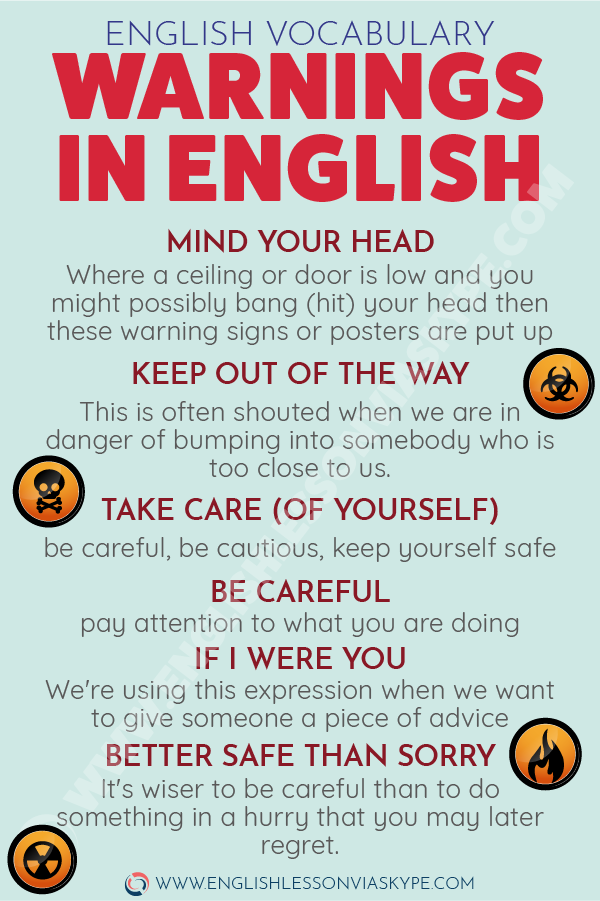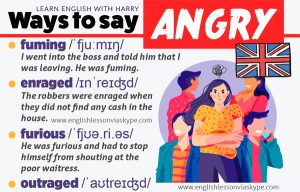People are always taking risks and as a result they are always likely to have accidents. Let’s learn how to warn someone in English.
We warn people about the dangers in many different ways.
These are often referred to as warning signs when it is official.
As an example a local government will put up (erect) warning signs like Danger keep out. This is to stop people going into a restricted area.
A farmer might put up a notice on his field Beware of Bull, Keep out.
And house owners often put up notices on their gates (particularly for the postman!) Beware of the Dog.
This warns people in advance so if anything happens the owners of the land (government or the farmer) have some protection against a legal action.

How to Warn Someone in English?
There are many more informal ways of warning people in English. Here are some of them:
1. MIND YOUR HEAD
Where a ceiling or door is low and you might possibly bang (hit) your head then these warning signs or posters are put up to help you.
2. MIND OUT OF THE WAY or KEEP OUT OF THE WAY!
This is often shouted when we are in danger of bumping into somebody who is too close to us.
For example, you are running along the street as you are late for the bus or tram. You shout at the people (politely) to mind out of the way or keep out of the way so you can get by more quickly.
3. TAKE CARE (OF YOURSELF)
be careful, be cautious, keep yourself safe
Take care driving in foggy conditions.
We can also use this phrase when we’re saying goodbye to family or friends.
4. BE CAREFUL
pay attention to what you are doing, be cautious
Be careful when using this new app and paying by card!
5. IF I WERE YOU
We’re using this expression when we want to give someone a piece of advice.
If I were you, I wouldn’t drive home tonight.
How to Warn Someone in English - Infographic

Enjoyed this infographic? Here’s what you can do next:
Many of warnings in English are written in the form of phrasal verbs (verb + preposition) but always remember if you want it to sound important or serious then when writing it use the exclamation mark! Or when speaking you must raise your voice (not necessarily scream or shout) to indicate it is a warning.
- Look out!
- Watch out!
- Watch it!
- Careful!
- Keep out!
All of these warnings in English basically mean the same.
- Look out my hands are full I might drop the plates!
- Watch out I am right behind you do not move!
- Watch it you nearly knocked into me!
- Careful you are spilling the wine!
If you are in a room (your bedroom) trying to get some peace and quiet then if someone knocks on your door you might say “go away, I am busy”. Teenagers will often use these phrases to warn their parents not to disturb them:
GO AWAY CAN’T YOU SEE I AM BUSY
or
GET OUT I AM BUSY!
(NEVER use it with people you don’t know as this is very impolite)
As in many languages, warnings in English can be given in many ways to advise us of a possible danger or risk so it is always a good idea to heed (take notice of) that warning.
Scroll down to learn English expressions related to warnings.
English Expressions related to Warnings
You can also use English idioms and expressions to warn people in English. Here are some examples of English expressions related to warnings:
BETTER SAFE THAN SORRY
It’s wiser to be cautious and careful than to do something in a hurry that you may later regret.
RED SKY IN THE MORNING, SHEPHERD’S WARNING
A red sky in the morning is a sign that bad weather will follow later.
TOO MANY COOKS (SPOIL THE BROTH)
When there are too many people trying to do the same job, this job will not be done well.
LOOK BEFORE YOU LEAP
Consider every possible scenario and weigh all the possible outcomes before making a decision.
More Information
For more information in English Expressions, English Phrasal Verbs and English Grammar Rules, check ou the following links:
English Phrasal Verbs with AROUND
English Demonstrative Pronouns
Intermediate English learners! Here is your chance to master English Grammar Tenses so you can speak English fluently and with confidence, sign up for 3 hour English Grammar Rules Refresher Course. Click on the link to read more.
Free resources are always available at British Council Learn English.
You will love these English lessons

16 Better Ways to Say Angry or Annoyed in English
Learn 16 better ways to say angry or annoyed in English · Furious · Fit to be tied · Hot under the collar meaning · Video lesson


Preposition On: Essential Phrases For Everyday Use
Preposition ON: from confusion to clarity. Say goodbye to mistakes and learn how to use the preposition ON correctly in


Easy English Expressions With OUT OF
Here you will learn 8 easy English expressions with OUT OF. Out of luck, out of the box, out of